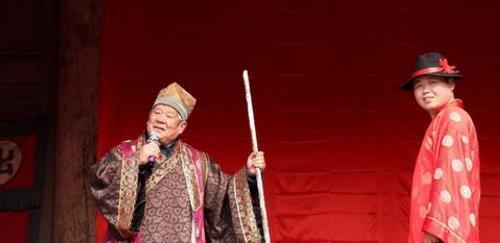The word "outside the staff" is believed to be familiar to everyone, and the word often appears in the literary works of the Ming and Qing dynasties, which is an official position, but it seems that there is no need to go to work, because the addition of a "foreign" word has become a kind of virtual position outside the official establishment. In fact, this was not the case at the beginning.

It did not exist even before the Qin and Han dynasties, and it was not until the end of Cao Wei that such an official position appeared, originally there was only a scattered riding regular attendant at that time, and later in addition to the official's positive forehead, the member outside the scattered riding regular attendant was added, which was dispensable, as a supplement to the scattered riding regular attendant, it was also its deputy position. In the Jin Dynasty, Yuanwailang specifically instructed Yuanwailang to ride a regular attendant, but later many other official positions also had Yuanwailang.
During the Sui and Tang dynasties, the number of members and foreign langs was more, and during the Sui and Tang dynasties, the system of three provinces and six ministries was implemented, and there were twenty-four divisions under the six departments, and Emperor Wen of Sui set up the position of yuanwailang in each division, and langzhong and yuanwailang constituted the chief and deputy chiefs of each division.
Taking the Tang Dynasty as an example, each silang was from the five pins (Tang Gaozu period: the official Lang Zhongzheng si pinshang, each silang Zhongzheng five pinshang); each division member wailang was from the six pins (Tang Gaozu period: the official wailang was six pins, and the various sirens were six pins). The subordinate officials under Lang Zhonghe and Yuanwai Lang also include the chief minister, Ling Shi, and so on.
It can be seen from here that although the official positions of the Sui and Tang dynasties were not particularly large, their power was not small, and they were the deputy chiefs of various divisions. At the beginning of the Tang Dynasty, the officials were in charge of the examination, appointment, removal, and transfer of civilian officials, and the official's examiner Wailang was once the chief examiner of the imperial examination, but later Tang Xuanzong felt that this official position was too small, so he let the ceremonial attendant on the zhengsipin to preside over the imperial examination. In order to show the importance attached to the imperial examination, the imperial examination has been presided over by the Ministry of Etiquette.
Du Fu, a famous poet of the Tang Dynasty, worked briefly as a member of the Inspection Department in 764, just after the Anshi Rebellion was put down, and resigned soon after. Another poet, Liu Yuxi, also served as a foreign lang, and during the Tang Shunzong period, there was a short "Yongzhen Reform", the purpose of which was to reform internal affairs, crack down on eunuch forces and cut the domain, and its core members were Wang Shuwen, Wang Ling, Liu Zongyuan, Liu Yuxi, etc., so they were also known as "Second King Liu Liu", when Liu Yuxi had a relatively good relationship with Wang Shuwen and was appointed as a Tuntian member of the outer lang. However, this reform was full of resistance, and even Tang Shunzong, who supported the reform, was forced by eunuchs to become emperor taishang, and after Tang Xianzong Li Chun succeeded to the throne, Liu Yuxi and Liu Zongyuan were degraded, and Liu Zongyuan also wrote a poem for Liu Yuxi called "Three Gifts to Liu Yuanwai".
In the dynasty after the Tang Dynasty, Yuanwailang was still the deputy chief of the six departments, but in the Ming and Qing dynasties, another kind of Yuanwailang was derived, and gradually became the mainstream at that time, that is, the real yuanwailang official position was not set up much, but only the virtual yuanwailang was popular.
The matter of selling officials has been around for a long time, and it is not a big news, and both the Han Dynasty and the Tang Dynasty have had the move of selling officials at the imperial court. The Ming and Qing dynasties were naturally no exception, during this period, many squires and landlords were relatively wealthy, and they wanted to make their identity look noble, so they donated some money to buy officials, and the imperial court usually let this part of the people be members of the foreign lang, that is, the common members in literary works.
At this time, the "outside of the staff" can only be regarded as a nominal idle post, some need to go to work, some simply do not have to go to work, but after all, the identity is stronger than before, but also half of the official people, so in this period, many rich people have become members, and the social status has instantly improved a grade.